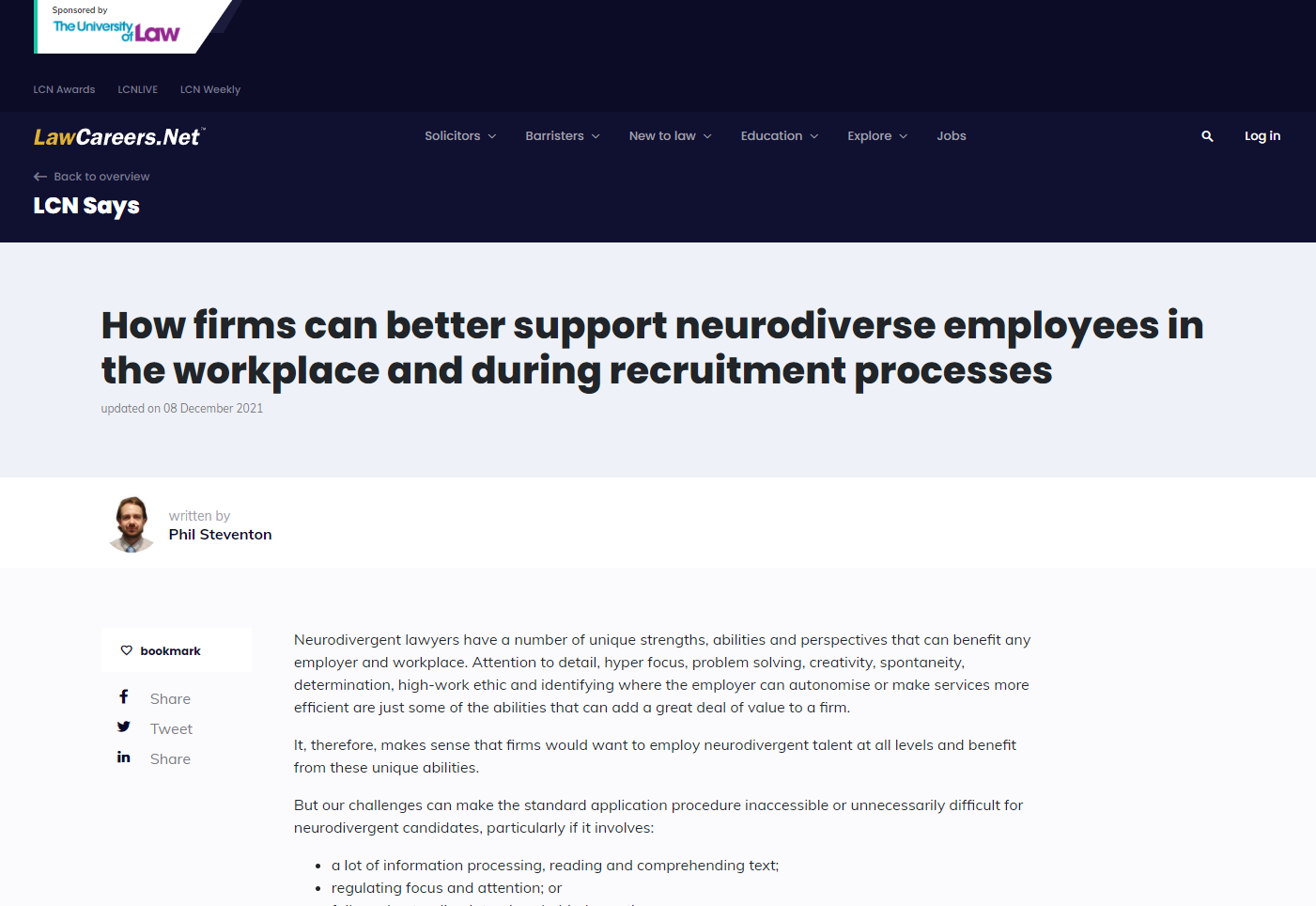Neurodivergent lawyers have a number of unique strengths, abilities and perspectives that can benefit any employer and workplace. Attention to detail, hyper focus, problem solving, creativity, spontaneity, determination, high-work ethic and identifying where the employer can autonomise or make services more efficient are just some of the abilities that can add a great deal of value to a firm.
It, therefore, makes sense that firms would want to employ neurodivergent talent at all levels and benefit from these unique abilities.
But our challenges can make the standard application procedure inaccessible or unnecessarily difficult for neurodivergent candidates, particularly if it involves:
- a lot of information processing, reading and comprehending text;
- regulating focus and attention; or
- fully understanding intentions behind questions.
So adjustments to the standard application process and the working environment to allow neurodivergent candidates to showcase our best selves are not only essential, but a legal obligation too.
Neuroinclusive workplaces
A neuroinclusive workplace is essential to allow us the opportunity to be at our best, and for a firm to benefit from our unique abilities, experiences and perspectives for themselves, their partners and their clients.
Here are a few reasons why it makes business sense to foster a neuroinclusive workplace:
- Diversity of cognitive approach is a great source of strength, and different ways of working and thinking can produce new ideas and challenge the firm to find better solutions.
- The diverse thinking of the team means smarter decisions are reached, and quicker and fewer meetings are needed.
- There is a legal requirement under the Equality Act to remove a physical feature, adjust a practice or provide an aid to address any disadvantage, and any firm will want to avoid costly legal action and any financial or reputational damage.
- We all have the need and desire to be productive; it is good for our mental wellbeing and greater inclusion, and will increase productivity, output and loyalty.
- It is the right thing to do. To be a good member of the diverse society in which we live, we need to include all those who want to be a part of it.
What should firms consider during the recruitment process?
Here are a few things firms should think about when recruiting.
Application and pre-interview
- Sharing case studies or experiences to show that you are neuroinclusive reassures applicants that their needs will be taken seriously. Logos for schemes like ‘Disability Confident’ and ‘Access to Work’ will encourage neurodivergent applicants.
- Check that your careers portal is engaging, isn’t too cluttered or has too much unused space, and that the language on job descriptions and adverts is clear and unambiguous.
- Ensure that the meeting room for an interview is away from lots of noise and distractions.
- Invite the applicant to familiarise themselves with the office and to learn names and faces of the interviewers.
- Assure the applicant that reasonable adjustments will be in place during the application and interview. Call or email before the interview to confirm these adjustments.
During the interview
- Panels may be overwhelming, so try having a roundtable discussion or a chat on sofas or comfy chairs.
- Allow extra time for any tasks to be completed during the interview.
- Be flexible with body language. Some applicants may struggle with maintaining eye contact, but don’t let this be make or break especially if the candidate is amazing.
- As working memory and recall may be a challenge, ask what a candidate would do in a situation rather than asking for examples and relying on the STAR technique.
- Information processing is not an uncommon challenge for neurodivergents – this may present as struggling to articulate answers, so be patient here and reassure the applicant that they deserve to be interviewed.
Each individual neurodivergent applicant will have different needs to other neurodivergent applicants at the recruitment stage. It isn’t enough to say that what you’ve put in place for one applicant is what every applicant will need. As the saying goes: “If you’ve met one of us, you’ve met one of us”.
The best way to learn what each neurodivergent applicant needs is to engage them at the earliest possible opportunity, ideally at the written/online application stage.
Post-application
Now that the candidate has been offered the role, here are some day-to-day things to think about:
Onboarding and inductions
- Talk about and implement reasonable adjustments early.
- Ask about learning style and adapt inductions accordingly.
- Schedule regular breaks during inductions.
- Offer summary information after inductions.
- Make clear the expectations of the recruit so there are tailored guidelines.
- Make clear any codes, rules or nuances along with what is acceptable and encouraged around behaviour and culture.
Day to day
- Allow for the neurodivergent employee learning using different ways and at different rates (either slower or quicker for different tasks).
- Provide additional training and refresher sessions, especially on complex tasks.
- Encourage them that everyone is there to do their best, but everyone’s 100% will be different so assess that accordingly when doing performance reviews.
- Be open to flexible ways of working such as altered hours, different locations, altered workloads so the employee doesn’t get overwhelmed, and be open to flexible attendances for meetings and events in case they are overwhelming to the employee.
- Be open to adjustments to those reasonable adjustments as time passes.
- Invite the neurodivergent employee to assist the company in making its recruitment and day-to-day practices more inclusive.
Adjustments to the application process and the day-to-day working life of a firm don’t normally cost anything to implement; only an open mind and time to actually adjust the working day for their neurodivergent employees.
By doing so, the firm is not only complying with its legal obligations to provide an accessible workplace for disabled employees, but the firm will also have employees who want to be there and who want to help their firm be more inclusive. In turn the firm will become much more profitable thanks to the unique abilities, and genuine desire to work hard and add value to the employer that neurodiverse employees can offer.
Phil Steventon is an autistic aspiring solicitor, blogger, content creator, speaker and charity trustee. Phil can be found on LinkedIn.
This article was originally published on www.lawcareers.net and has been republished with permission from Phil Steventon. View the original publication here.




